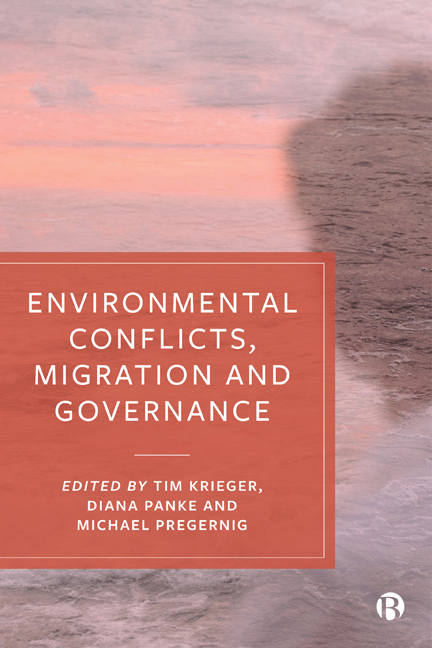Book contents
- Frontmatter
- Contents
- List of Figures and Tables
- List of Acronyms
- Notes on Contributors
- Acknowledgements
- 1 Environmental and Resource-Related Conflicts, Migration and Governance
- 2 Renewable Resource Scarcity, Conflicts and Migration
- 3 Extractive Resources, Conflicts and Migration
- 4 Climate Change, Conflicts and Migration
- 5 The Individual Level: Selection Effects
- 6 The Individual Level: Sorting Effects
- 7 Migration Governance at the State Level: Policy Developments and Effects
- 8 Environmental Migration Governance at the Regional Level
- 9 Migration Governance at the Global Level: Intergovernmental Organizations and Environmental Change-Induced Migration
- 10 The Link between Forced Migration and Conflict
- 11 Conflict-Prone Minerals, Forced Migration and Norm Dynamics in the Kimberley Process and ICGLR
- 12 On the Nexus Between Environmental Conflict, Migration and Governance: Concluding Remarks
- Index
12 - On the Nexus Between Environmental Conflict, Migration and Governance: Concluding Remarks
- Frontmatter
- Contents
- List of Figures and Tables
- List of Acronyms
- Notes on Contributors
- Acknowledgements
- 1 Environmental and Resource-Related Conflicts, Migration and Governance
- 2 Renewable Resource Scarcity, Conflicts and Migration
- 3 Extractive Resources, Conflicts and Migration
- 4 Climate Change, Conflicts and Migration
- 5 The Individual Level: Selection Effects
- 6 The Individual Level: Sorting Effects
- 7 Migration Governance at the State Level: Policy Developments and Effects
- 8 Environmental Migration Governance at the Regional Level
- 9 Migration Governance at the Global Level: Intergovernmental Organizations and Environmental Change-Induced Migration
- 10 The Link between Forced Migration and Conflict
- 11 Conflict-Prone Minerals, Forced Migration and Norm Dynamics in the Kimberley Process and ICGLR
- 12 On the Nexus Between Environmental Conflict, Migration and Governance: Concluding Remarks
- Index
Summary
Introduction
This volume sets out to shed new light on the nexus between environmental and resource-related problems that lead to conflict and migration; it has throughout emphasized the importance of governance. The starting point of the analyses has been the environmental or natural resource problem. Natural resource problems can take the form of either resource scarcity or resource abundance, the latter of which leads to political resource-curse phenomena (corruption, rent seeking and deteriorating institutional quality). Environmental problems include, among others, natural or man-made disasters, crop failures and environmental degradation, which may be related to climate change. These issues have been argued to lead to conflict, which in turn triggers out-migration (Krieger et al, 2019, in this edition. See Chapter 1, Figure 1.1 in this volume). This environmental conflict– migration nexus is the focus of this book. To be sure, not all environmental and natural resource issues lead to conflict, not all conflicts caused by environmental and natural resource issues lead to significant out-migration, and migration may be caused by a host of other reasons besides environmental conflicts, including many that are not conflict-related at all. Yet, the environmental conflict– migration nexus studied in this volume is undoubtedly relevant and deserves our attention. The chances are that it will increase in significance in the years to come.
This concluding chapter highlights the key insights of the book and emphasizes the importance of governance for environmental conflicts and for migration. It argues that it is essential to model the interplay between governance, environmental problems, induced conflict and out-migration correctly, comprehensively and contextspecifically. Moreover, it raises methodological issues of analyzing the environmental conflict– migration nexus, which puts the importance of this nexus into perspective.
What have we learnt?
This volume covers a wide array of relevant questions on the environmental conflict– migration nexus. So, what is the essence of what we have learnt from these contributions?
Based on an extensive literature review, Tobias Ide (Chapter 2) argues that renewable resources have become scarcer and that this increased renewable resource scarcity is not likely to lead to inter-state conflict, but will rather fuel low-intensity intra-state conflicts. Pathways leading to conflict are not well understood, and empirical evidence is mixed; renewable resource scarcity may not be the main driver of conflicts but may exacerbate pre-existing ones.
- Type
- Chapter
- Information
- Environmental Conflicts, Migration and Governance , pp. 219 - 230Publisher: Bristol University PressPrint publication year: 2020



